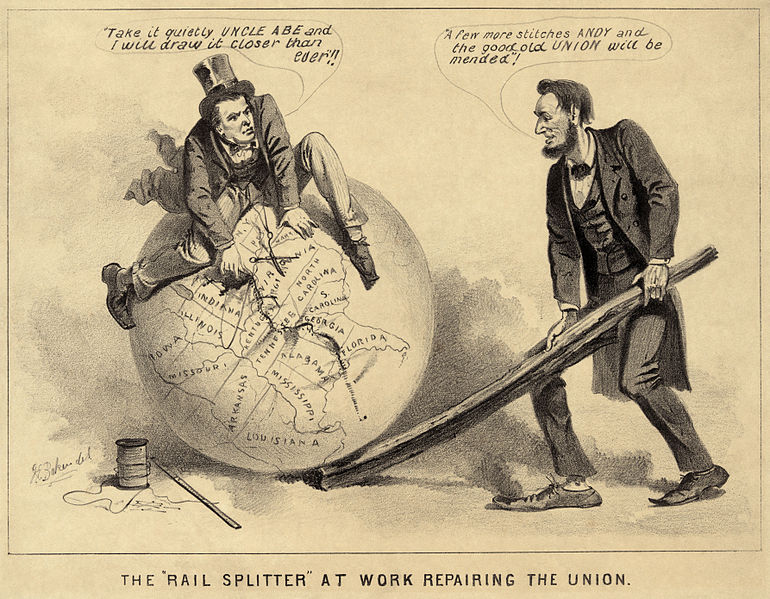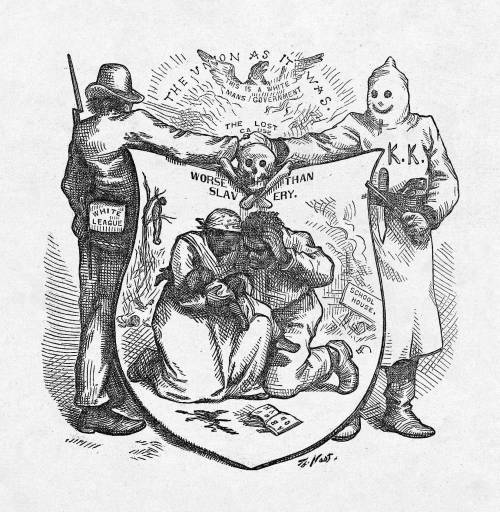After the chaos of the American Civil War, Congress and lawmakers had to figure out how to put the Union back together again–no easy feat, considering that issues of political debate were settled on the battlefield, but not in the courtroom nor in the arena of public opinion. How did the defeated South and often vindictive North manage to resolve their differences over issues so controversial that they had torn the Union apart?
Historian H.W. Brands from UT’s Department of History reflects on this issues and how he has dealt with them in his thirty years of experience in teaching about Reconstruction: “It’s one of the hardest parts of American history to teach, in part because I think it’s the hardest to just understand.”
Guests
 H.W. BrandsDickson, Allen, Anderson Centennial Professor of History at the University of Texas at Austin
H.W. BrandsDickson, Allen, Anderson Centennial Professor of History at the University of Texas at Austin
Hosts
 Joan NeubergerProfessor of History, University of Texas at Austin
Joan NeubergerProfessor of History, University of Texas at Austin
Today’s topic is Reconstruction—the period after the US civil war—and why don’t we just start by asking you what the goals of Reconstruction were and what some of the obstacles were to its progress.
Well, the reason I want to talk about Reconstruction is I have been teaching about Reconstruction now for … I guess for thirty years, and I am still trying to figure out Reconstruction. It’s one of the hardest parts of American history to teach, in part because I think it’s the hardest to just understand.
The basic problem was that the country had ripped itself apart during the Civil War (click to hear George Forgie discuss the origins of the civil war—ed.), and had to figure out how to put itself back together. I have had this particular interest in Reconstruction lately because, for the last five years, I have been working on this book about Ulysses Grant. Grant is a good illustration of a principle that I have come to appreciate, both with Grant—and I had written an earlier book on Franklin Roosevelt—and the principle is: that war is the easy part. It’s the period after the war that is the hard part.
I think you can see this is true in American history, and also in European history and every place else. In war you ask a lot of people, but the questions that are at issue are pretty straightforward. And the way you resolve the questions is that you don’t have to persuade people, all you have to do is beat them into submission. So when I am thinking about Reconstruction—and anybody who teaches Reconstruction starts with Reconstruction under Lincoln, because Reconstruction began while the Civil War was still on. But it extends past Lincoln to Andrew Johnson and then into Ulysses Grant. In fact, most of reconstruction occurs under Ulysses Grant.

So, I was working on this book about Ulysses Grant, and with Grant there are sort of two parts of his public life. There is Grant the soldier, and Grant the president. There is Grant during the Civil War and Grant during Reconstruction. So Grant is this great hero, the victor of the Civil War, and he becomes, sort of despite himself, president during Reconstruction. And he discovers that things are a lot harder in the White House than they were on the battlefield. Now partly this is Grant’s personality, because, like a lot of soldiers, Grant is really drawn to war. And he is not drawn to the violence of war, but drawn to the simplicity, the straightforwardness of war. He manages that really well, and he is really good at this.
Then he becomes president and he discovers that life is a lot harder than he thought it was going to be. But this is one of the things I tell my students to sort of shock them: is to say that it was a really good thing that Abraham Lincoln died when he did; he was murdered. It was a good thing for his historical reputation because now we can think of Lincoln as the great hero. And those of us in American history, and the sort of political science business, we rate our presidents periodically, and Lincoln always lands right at the top, because, what’s not to like about Lincoln? He’s the guy that held the Union together and then ended slavery. But if Lincoln had lived, his reputation would have been severely tarnished. Reconstruction was going to damage, if not ruin, the reputation of anyone who was president at the time.
So the basic problem is this: the country has split during the war, and now it’s going to be put back together. But there are a couple of very basic issues that cause contradictions on both sides of the question, because there is a very interesting inversion of attitudes and interpretations. During the war, Lincoln and the Unionists—the North—said that the South had not seceded because secession was constitutionally impossible. And Lincoln, until nearly the very end of the Civil War refused to call it a war, it was The Rebellion. And he certainly did not call it the Civil War; it was the war of the states that were against the union. And the reason he had to do it this way was because if he called it a war, in most people’s minds a war meant a contest between two sovereign entities. The southern states were not, in Lincoln’s view, sovereign at all. So during the war, Lincoln says the south never seceded, and the south of course says “Yes, we did, we are a sovereign nation.”
Well the war ends, and then the question is: so how do you put this back together?
Now, Lincoln dies just as Reconstruction gets serious. There was wartime Reconstruction, but it was military occupation—military government—and that was going to persist after the war for a while. But everybody knew that couldn’t last forever. Because in democracy, you don’t get to govern by the sword; you have to govern by the vote. So the question was: how long does this military government last? And as soon as the war ends, the Union—or more precisely now the Republican party—which is running the Union government during the war because of the succession of the south, which takes away all the southern Democrats, and that is a very large part of the Democratic party.
The Republicans begin to say, “You know what? Now that you mention it, I think you guys really did leave the Union, which meant extraordinary measures have to be to taken to bring you back into the Union.” Which is not what they were saying during the war, they were saying “You never did leave the Union.”
The South, which during the war had been saying, “Yes, we left the union, we are an entirely separate entity now,” now begin to say, “On second thought, I think you were right in the first place. We never did leave the union, and so therefore there is really nothing to reconstruct. The war is over. We will simply resume our place. We will send our senators and congressmen to Washington, and all will be as it was before.”
So, the Republicans in the north who say this is not going to happen.
But one of the things that adds more complexity to this—and the thing I love about history is that things are always more complicated than they seem, and the deeper you dig, the more layers of the onion you find. I’ve just described the attitude of northerners and Republicans regarding reconstruction, and the attitudes of the southerners and the Democrats.

And then, things get complicated by the fact that this new president, on the death of Lincoln, is Andrew Johnson, who is sort of wrong on all counts. He is not a Republican; he is a Democrat. The reason he was added to the Republican ticket—except it wasn’t called the Republican ticket in 1864 it was called the National Union ticket—the reason he was added to Lincoln’s ticket was that Lincoln thought he was going to lose the election in 1864 and he needed to broaden his base as much as possible. So he includes a Democrat named Andrew Johnson, but he was a southerner from Tennessee, but he was a Tennessee Unionist. So he took the right side politically for the nation, but not for his own state.
So southerners hate him because he’s a southerner who didn’t support succession, and northerners distrust him because he’s a southerner. Democrats don’t like him because he ran on a Republican ticket, and Republicans don’t like him because he’s a Democrat. And the Republicans are starting to think, “Wait, we won this war, but who’s the guy in the White House? He’s a Democrat, and he’s a southerner. This isn’t right at all.”
Now, Lincoln would have been spared that part of course, because he was a Republican and northerner and all this.
But what he wouldn’t have been spared what might have been the biggest issue in Reconstruction—and this is often overlooked—is the relationship between states and the federal government. What happened during the Civil War was that Lincoln mounted what you can almost call an Executive Coup in seizing power from the Legislature. One of the things that Americans as people discovered during the war was that war allows the President to do a lot of stuff that they can’t do otherwise. And there is this natural gravitation of power away from Congress towards the Presidency. Some of it simply reflects the fact that you can’t run a war by committee—a committee that now has 535 members of Congress, it was less than that in the 19th century—but still, if you have one commander in chief—which is Constitutionally the reason why the president is commander in chief—you could be much more efficient.
So Lincoln seized a whole lot of power from Congress during the war, and Congress was willing to let that happen during the war. But as soon as the war was over, Congress was going to claw that back. And Lincoln understood this, and for those listeners who have seen the movie Lincoln, in the Steven Spielberg version, which is more or less accurate, Lincoln realizes that he is going to lose a lot of his control of the political situation once the war ends.
Now, he usually thinks in terms of the southern states and all this, but it really has to do with Congress. Congress is going to try to gain power back. If Lincoln would have been President, he would have been better placed to resist the encroachments, or the attempts by Congress to gain back some of the power. But he wouldn’t have been able to resist it entirely.
Andrew Johnson had no chance. He was wrong party, wrong section, and had no political following himself. So, Congress took out their frustrations on Andrew Johnson. And he served out his term; it was almost a full four-year term because Lincoln was assassinated very shortly into his second term. But everybody knew that he was going to be one term. In fact, he was impeached. He wasn’t convicted, but he managed to survive by one vote. So people immediately begin looking toward the next president. By the middle of Johnson’s term it becomes clear that the next president was going to be Ulysses Grant.
Americans have long had this soft spot for generals, and so they chose this general. And Grant is canny enough to realize that he doesn’t have to take a position on any issues while he’s running. All he has to say is, and this is what he said, “let us have peace.” First of all, he was the war hero who could say “let us have peace,” and it had real resonance. Secondly, there was already breaking out this insurrection in the South. One of the most shocking aspects of Reconstruction in the South was the rise of the Ku Klux Klan.
Now, at the end of the Civil War, Grant had been very concerned that the surrender of Robert E Lee, and Lee’s army of northern Virginia, would not necessarily convince the other Confederates and their armies to surrender. In fact they did at the time, but he was really afraid that some of the Confederates would simply take to the hills and engage in a kind of guerilla war against the government.
Well, that’s in a sense what happened with the rise Ku Klux Klan. As southerners became very resistant to the 13th, 14th, and 15th amendments to the Constitution, which freed the slaves, and then made them citizens, and then gave them the right to vote. And there are a whole lot of people in the South, by no means all white southerners, but very many white southerners, who said, “No, we are not going to accept this on principle, and especially if it is enforced upon us by the federal government, because we didn’t like the federal government before the war and we still don’t like it. We just lost the war; we weren’t convinced.”

So Grant has to deal with military insurrection in the South, the Ku Klux Klan. Of course, he happens to be just the right guy to deal with military insurrection and one of Grant’s real contributions to Reconstruction was to persuade Congress to give him authority to use force, to suspend habeas corpus, and to declare martial law in the South in regions where the Klan was out of control, or where the Klan had intimidated not simply blacks and Republicans, but state governments. So Grant sent the army in and breaks up the Klan. And in fact, the Klan disappears from American public life until the 20th century, when it is revived under different circumstances.
The fundamental problem that Grant couldn’t get around, though, is this, and it has to do with the nature of democracy. In a democracy, what do you do when a large minority of people are utterly opposed to policies that the majority wants? And especially in a federal democracy like the United States, what do you do when the national will says blacks—African Americans—ought to have equal rights; but in the states in the South, there is a majority that says they shouldn’t. What do you do?
Now, this was what gave rise to the Civil War, because this question of who is supreme, state or federal government? And it was a problem that was resolved on the battlefield. When Lee surrenders at Appomattox, we think we have an answer to this question. But that battlefield decision didn’t really last very long. It didn’t stick.
Grant discovered, the nation discovered, that you can amend the Constitution, you can on paper say that African Americans are freed men and equal to whites throughout the country. But if you’ve got operative majorities in the southern states who simply reject it, that there’s only so long that you can make that happen. Grant was the last president between Abraham Lincoln until Lyndon Johnson to take civil rights seriously. But even Grant realized that he couldn’t hold the line on this forever. So, Reconstruction ends about the time that Grant leaves office. In fact, usually the political compromise that elected Grant’s successor is seen as the end of Reconstruction.
Reconstruction resolved some issues. So, the disputes between the federal government and the states would not give rise to a Civil War again, and slavery was ended—it was never going to be reconstituted. But there were some really loose threads lying around. What really was the position of African Americans in the South? This wouldn’t be resolved until the middle or the end of the 20th century.
And then, there is this question that is still with us today. When the states don’t agree with what the federal government is going to do, whose position has precedence? The Supreme Court right now is dealing with these issues. The Governor of Texas is trying to decide—he’s already made his decision, so far—as to whether the states have to accept Medicaid expansion or not.
So one of the things that makes history so fascinating, is that we resolve some of these issues for a while, but they just come back.